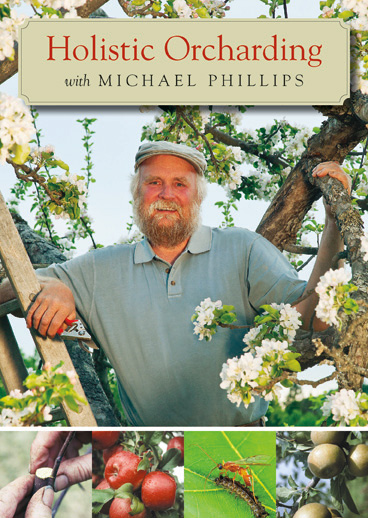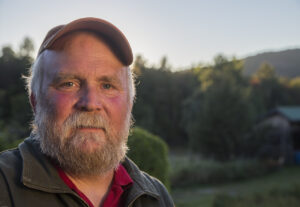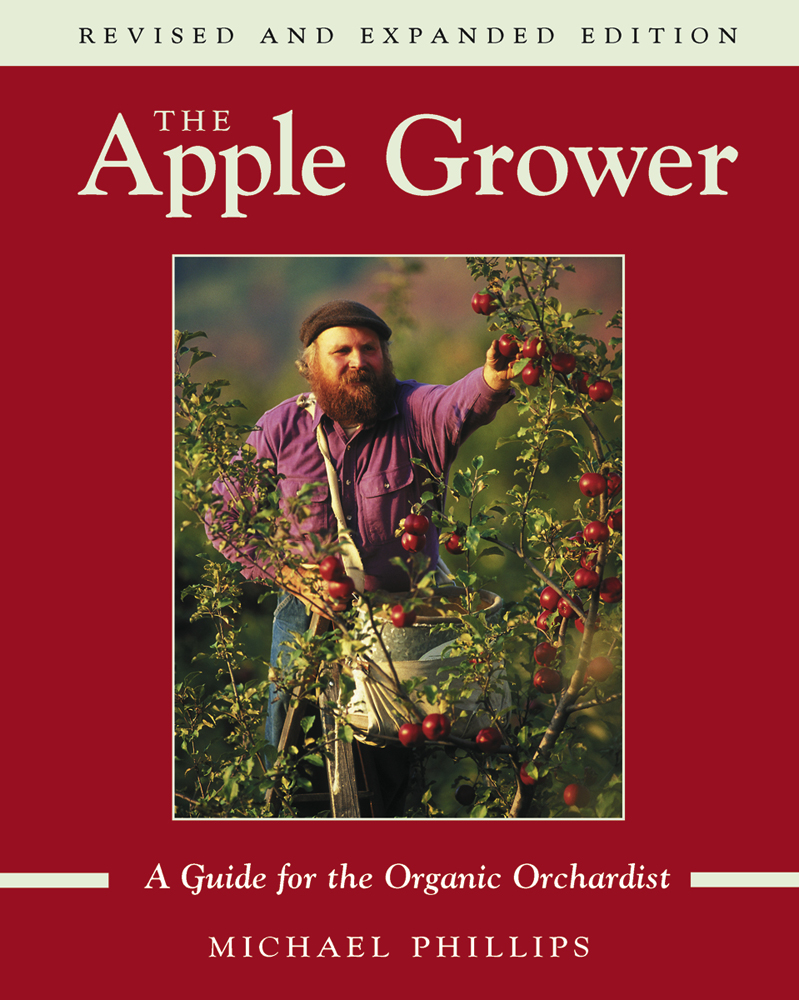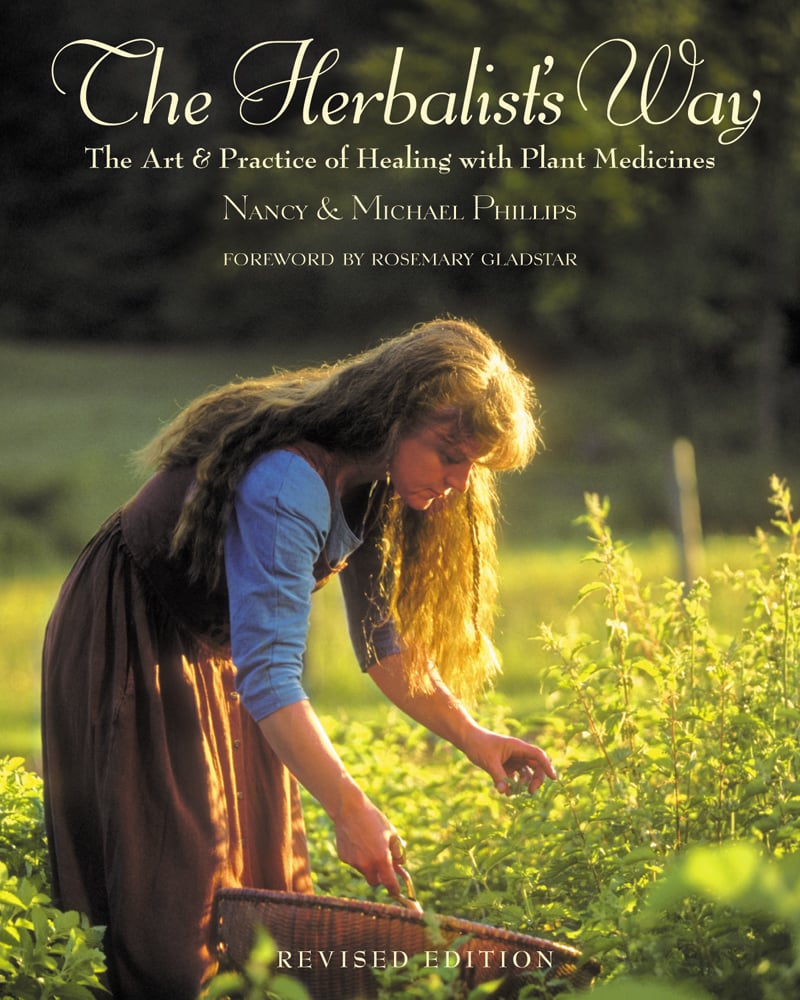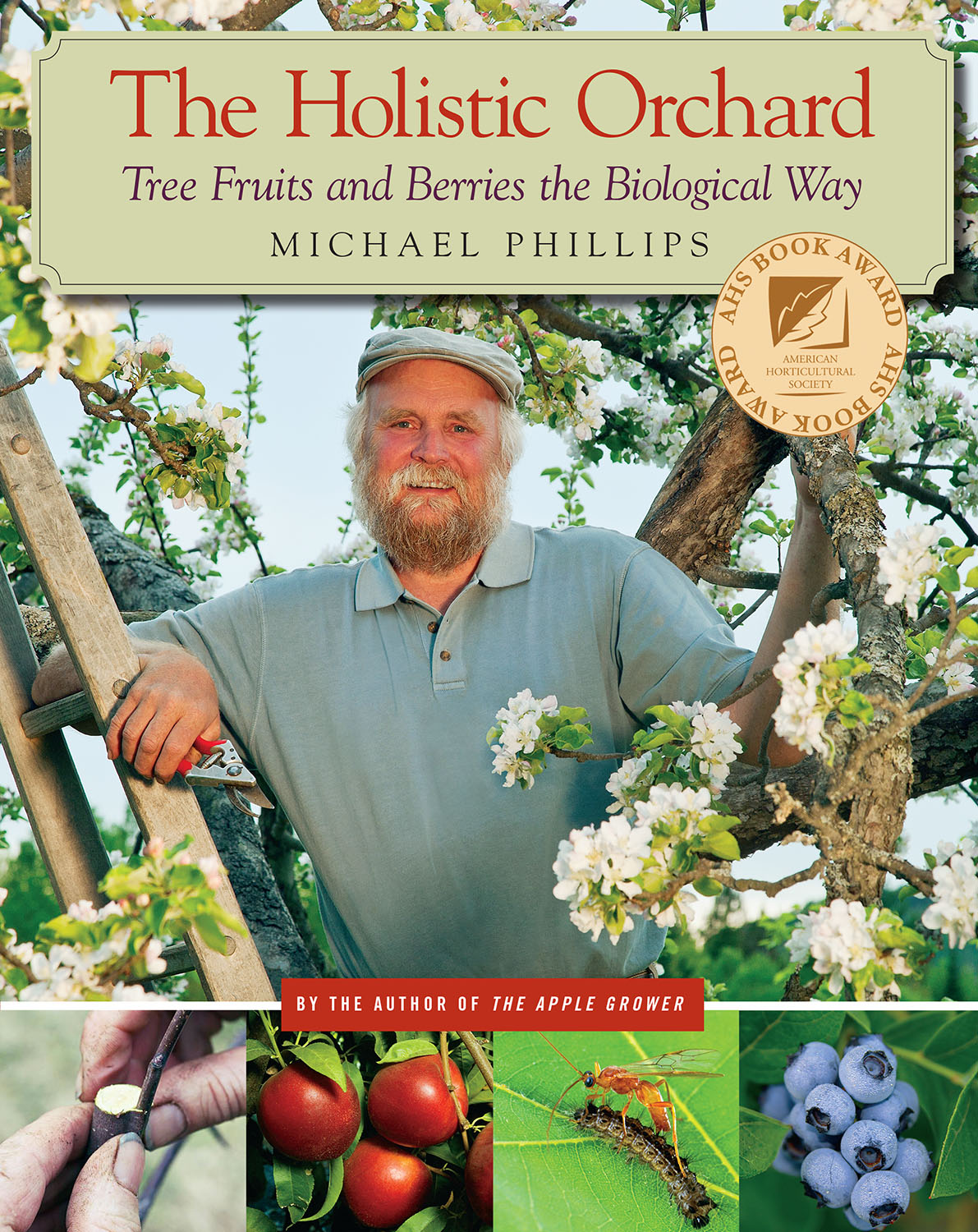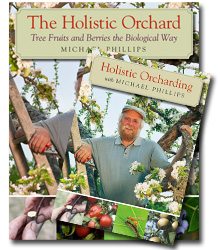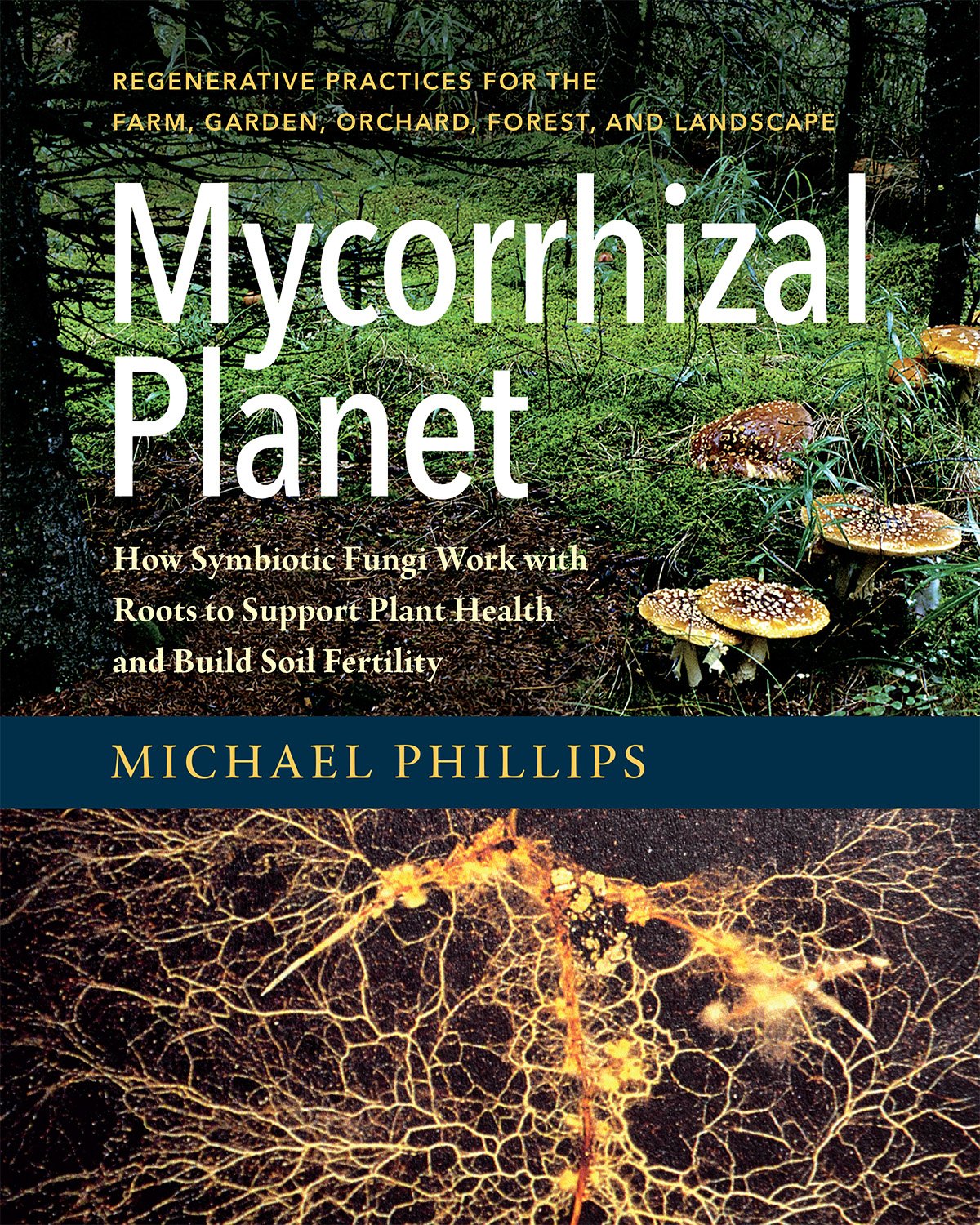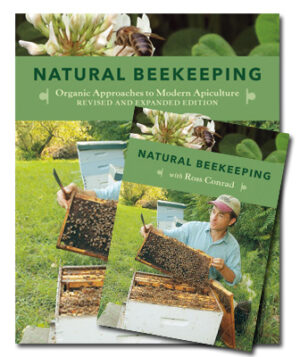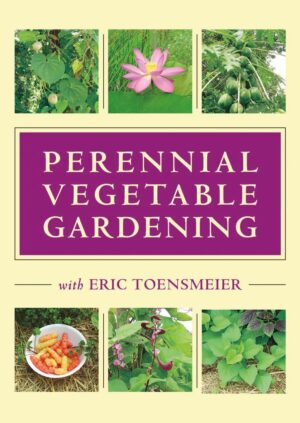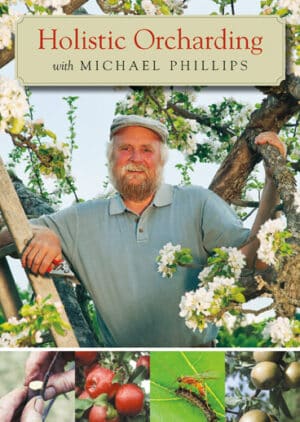| Playtime: | 180 minutes |
| Size: | 6 x 7.5 inch |
| Publisher: | Chelsea Green Publishing |
| Pub. Date: | February 1, 2013 |
| ISBN: | 9781603583961 |
Also available in:
Holistic Orcharding with Michael Phillips (DVD)
Every farm and homestead can enjoy the timeless pleasure of a fruit orchard. Yet this can also be challenging, because few people today have the depth of knowledge and experience that’s needed to produce healthy trees and nutritious, great-tasting fruit. At the same time, both orchardists and consumers are looking to avoid spraying harmful and expensive chemicals on their trees.
The answer is to create a more holistic orchard, one that emphasizes biological health and diversity – from the microscopic fungi in the soil to the beneficial insects, companion plants, and the birds and wildlife that together form a complete and living orchard ecosystem. In other words, it’s time for us to start working with nature, rather than fighting against it.
Michael Phillips is a pioneering author and orchardist whose books include The Holistic Orchard and The Apple Grower. In this video, he leads viewers through a year in his own orchard, demonstrating basic horticultural skills like grafting and pruning, but also revealing groundbreaking and field-tested strategies for growing apples and other tree fruits not just organically, but holistically. With this information in hand, there’s now every reason to confidently plant that very first fruit tree!
Reviews and Praise
ForeWord Review-
Despite a wealth of information available about grafting, soil health, tree planting, and pruning, there’s one major area of orchard management that’s tough for any beginner to learn: confidence.
That’s where Michael Phillips comes in. As a farmer in northern New Hampshire, and author of The Apple Grower, he provides gentle-but-sure advice on holistic orchards in a way that’s encouraging and valuable.
“Gaining confidence to do this right is key,” he writes. “You simply need to get over that proverbial hump that somehow you’re going to screw this up and waste both time and money.” Phillips wrote this guide, he adds, to give beginners the type of inspiration and knowledge they’ll need to take a deep breath and get started.
Beginning with a fascinating explanation of forest-edge ecology—which defines where fruit trees thrive best—Phillips moves into topics like fungal dominance, haphazard mulching, pulsing agents, and more. He also tackles orchard design, horticulture, and orchard dynamics in tremendous detail, with abundant illustrations and photographs that give more clarity to his discussions.
For those moving to the next level of orchard management, Phillips delves into the specifics of three major categories of fruits: pome, which includes apples and pears; stone, which encompasses cherry, peach, plum, and apricot; and woody berries, including blackberry, currant, gooseberry, and raspberry. For each, he describes varieties worth considering, pest management, pollination issues, and harvest notes.
Throughout, Phillips adopts a genial tone that blends farmer-next-door friendliness with a more academic approach. The mix works, giving the scientific descriptions more weight while keeping the material accessible. His passion for sustainable agriculture is obvious as well, and drives the book nicely—rather than see fellow growers as competitors, for example, he’s keen on expanding the community of growers and he’s willing to share all his insights to achieve that mission.
In general, the sheer breadth of information presented can seem overwhelming, particularly for a beginner, but it’s likely that those who are interested in getting started in holistic orchard practices will appreciate having such a thorough reference guide.
More Reviews and Praise
Publishers Weekly-
The author of the classic guide for small-scale fruit cultivation, The Apple Grower, returns to the orchard. Phillips, who grows apples and herbs in New Hampshire, concedes early on that growing fruit that is both attractive and delicious is more challenging than cultivating vegetables and herbs. What distinguishes this book from other organic guides is the author's ecological approach. He argues that orchard success begins with a deep understanding of soil health and forest-edge ecology. The chemistry lessons may challenge many, but he translates most of the science basics into practical routines that any gardener could use. Straightforward information on selecting trees and horticultural basics such as pruning and pest management follows. For those who intend to invest significant time and resources into growing fruit, this is a comprehensive guide to managing a healthy and bountiful orchard. Color photographs and illustrations throughout.
Booklist Review-
With the rising popularity of farmers’ markets and ever-increasing availability of organic foods in mainstream grocery stores, more and more gardeners are catching the urge to go pesticide-free. For fruit lovers wanting to tend an orchard on a small scale, Phillips, author of the gardening best-seller The Apple Grower, offers a wealth of tips and tricks here on growing berries and tree fruits without resorting to toxic sprays. Eight information-packed chapters cover such basics as orchard design, seeding and growing schedules, and soil varieties, all using natural methods of cooperating with nature to resist attacks by garden pests and plant diseases. Phillips also provides an exhaustive directory of fruit varieties, from pome fruits, such as apples and pears, to stone fruits, such as cherries and nectarines. Although the guide is aimed primarily at home growers with a little yard space and a yen for organic produce, professional orchard managers can certainly benefit and will hopefully be prompted to shy away from pesticides as well.
Library Journal-
"Phillips, farmer, author, and organic orchardist, guides the viewer through four seasons of his New Hampshire farm, emphasizing techniques for a 'health-based' approach to managing a fruit orchard. His holistic approach not only eschews the use of chemicals and pesticides but also helps to promote biological health and diversity in soil fungi and birds and insects. Phillips demonstrates a variety of practices, from planting, fertilizing, grafting, propagating, pruning, and managing insects to harvesting (including the proper way to pick an apple) and shows how these techniques can be applied in any area of the country. VERDICT: This detailed video with visual how-to instructions will be of interest to horticultural audiences.”
Reviews and Praise
ForeWord Review-
Despite a wealth of information available about grafting, soil health, tree planting, and pruning, there’s one major area of orchard management that’s tough for any beginner to learn: confidence.
That’s where Michael Phillips comes in. As a farmer in northern New Hampshire, and author of The Apple Grower, he provides gentle-but-sure advice on holistic orchards in a way that’s encouraging and valuable.
“Gaining confidence to do this right is key,” he writes. “You simply need to get over that proverbial hump that somehow you’re going to screw this up and waste both time and money.” Phillips wrote this guide, he adds, to give beginners the type of inspiration and knowledge they’ll need to take a deep breath and get started.
Beginning with a fascinating explanation of forest-edge ecology—which defines where fruit trees thrive best—Phillips moves into topics like fungal dominance, haphazard mulching, pulsing agents, and more. He also tackles orchard design, horticulture, and orchard dynamics in tremendous detail, with abundant illustrations and photographs that give more clarity to his discussions.
For those moving to the next level of orchard management, Phillips delves into the specifics of three major categories of fruits: pome, which includes apples and pears; stone, which encompasses cherry, peach, plum, and apricot; and woody berries, including blackberry, currant, gooseberry, and raspberry. For each, he describes varieties worth considering, pest management, pollination issues, and harvest notes.
Throughout, Phillips adopts a genial tone that blends farmer-next-door friendliness with a more academic approach. The mix works, giving the scientific descriptions more weight while keeping the material accessible. His passion for sustainable agriculture is obvious as well, and drives the book nicely—rather than see fellow growers as competitors, for example, he’s keen on expanding the community of growers and he’s willing to share all his insights to achieve that mission.
In general, the sheer breadth of information presented can seem overwhelming, particularly for a beginner, but it’s likely that those who are interested in getting started in holistic orchard practices will appreciate having such a thorough reference guide.
Publishers Weekly-
The author of the classic guide for small-scale fruit cultivation, The Apple Grower, returns to the orchard. Phillips, who grows apples and herbs in New Hampshire, concedes early on that growing fruit that is both attractive and delicious is more challenging than cultivating vegetables and herbs. What distinguishes this book from other organic guides is the author's ecological approach. He argues that orchard success begins with a deep understanding of soil health and forest-edge ecology. The chemistry lessons may challenge many, but he translates most of the science basics into practical routines that any gardener could use. Straightforward information on selecting trees and horticultural basics such as pruning and pest management follows. For those who intend to invest significant time and resources into growing fruit, this is a comprehensive guide to managing a healthy and bountiful orchard. Color photographs and illustrations throughout.
Booklist Review-
With the rising popularity of farmers’ markets and ever-increasing availability of organic foods in mainstream grocery stores, more and more gardeners are catching the urge to go pesticide-free. For fruit lovers wanting to tend an orchard on a small scale, Phillips, author of the gardening best-seller The Apple Grower, offers a wealth of tips and tricks here on growing berries and tree fruits without resorting to toxic sprays. Eight information-packed chapters cover such basics as orchard design, seeding and growing schedules, and soil varieties, all using natural methods of cooperating with nature to resist attacks by garden pests and plant diseases. Phillips also provides an exhaustive directory of fruit varieties, from pome fruits, such as apples and pears, to stone fruits, such as cherries and nectarines. Although the guide is aimed primarily at home growers with a little yard space and a yen for organic produce, professional orchard managers can certainly benefit and will hopefully be prompted to shy away from pesticides as well.
Library Journal-
"Phillips, farmer, author, and organic orchardist, guides the viewer through four seasons of his New Hampshire farm, emphasizing techniques for a 'health-based' approach to managing a fruit orchard. His holistic approach not only eschews the use of chemicals and pesticides but also helps to promote biological health and diversity in soil fungi and birds and insects. Phillips demonstrates a variety of practices, from planting, fertilizing, grafting, propagating, pruning, and managing insects to harvesting (including the proper way to pick an apple) and shows how these techniques can be applied in any area of the country. VERDICT: This detailed video with visual how-to instructions will be of interest to horticultural audiences.”


